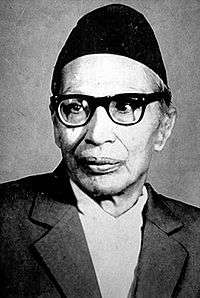Siddhicharan Shrestha

Siddhi Charan Shrestha (Devanagari: सिद्धिचरण श्रेष्ठ) (21 May 1912 - 4 June 1992) was one of the most prominent writers of Nepal. He contributed to the struggle against the autocratic Rana regime (1846-1951) through his writings. His revolutionary poetry aroused freedom fighters, and he was sentenced to 18 years in jail for his literary activities. He wrote in Nepal Bhasa and Nepali.[1] [2]
His poem "My beloved Okhaldhunga" in Nepali is considered to be one of his masterpieces. In this poem, he has expressed how proud he is to describe the place Okhaldhungain eastern Nepal, where he was born and grew up.
Early years
Siddhi Charan's ancestors moved to Ombahal of Kathmandu from Bhaktapur. His father Bishnu Charan (novelist) worked for the government and wrote novels like "Sumati" and "Bhismapratigya". In the course of his service, he was transferred to Okhaldhunga in east Nepal where Siddhi Charan was born on 9th Jestha 1969 B.S. and spent his childhood. Siddhi Charan's mother was Neer Kumari Shrestha. In 1919 A.D when he was seven years old, the family returned to Kathmandu.
Siddhi Charan studied at Durbar High School. One day in 1926, he observed an old man bent over his writing at a herbal shop at Kamalachhi near his school. The old man was renowned Nepal Bhasa poet Siddhi Das Amatya. Siddhi Charan eventually considered Amatya as his guru.[3] [4]
In jail
In 1940, Siddhi Charan was accused of sedition by the Rana regime and sentenced to 18 years in prison for a poem he had written in Nepal Bhasa. It contained the line "Without revolution, there can be no proper peace".
Many poets, besides political activists, had been rounded up along with Siddhi Charan. And his fellow inmates in jail included writers Chittadhar Hridaya, Phatte Bahadur Singh and Dharma Ratna Yami and artist Chandra Man Singh Maskey. The confinement of writers resulted in a creative outpouring, with many of them, including Siddhi Charan, producing epics.
Siddhi Charan's father died while he was in prison, but he was not permitted to perform the last rites. The grief drove him to compose poetry filled with anguish. Siddhi Charan was released in 1945.[5]
Journalism
Siddhi Charan also worked as a journalist. He was the editor of Nepal's first daily newspaper Awaj which was launched on 19 February 1951, a day after the Ranas were overthrown in a revolution.[6] He was also associated with Sharada, a literary journal, and the Gorkhapatra, which was then a bi-weekly newspaper.
Honors
In 1993, Nepal's Postal Services Department issued a commemorative postage stamp bearing a portrait of Shrestha to honor his contribution to Nepalese literature.[7] A highway in eastern Nepal that leads to Okhaldhunga has been named Siddhi Charan Highway.
References
- ↑ Karthak, Peter J. (4 June 2006). "Henrik Ibsen, Siddhi Charan and Chitta Dhar". The Kathmandu Post. Retrieved 7 March 2013.
- ↑ Lienhard, Siegfried (1992). Songs of Nepal: An Anthology of Nevar Folksongs and Hymns. New Delhi: Motilal Banarsidas. ISBN 81-208-0963-7. Page 4.
- ↑ Khairgoli, Sichu. "Siddhi Charan Shrestha". Retrieved 8 March 2013.
- ↑ Bajracharya, Phanindra Ratna (December 2012). "Kavi Siddhi Charan Shrestha ya Nepal Bhasay Sahitya Yatra". Thaunkanhe. Page 4.
- ↑ Bajracharya, Phanindra Ratna (December 2012). "Kavi Siddhi Charan Shrestha ya Nepal Bhasay Sahitya Yatra". Thaunkanhe. Page 3.
- ↑ "History of Nepali Journalism". Nepal Press Institute. 15 February 2010. Retrieved 14 March 2013.
- ↑ "List of Nepali Postage Stamps Issued". Retrieved 6 March 2013.